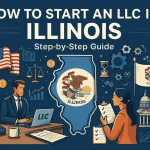Delaware is known for its business-friendly laws and is a popular state for LLC formations. Here’s how to form your Delaware LLC:
1. Name Your Delaware LLC
Choose a name that meets Delaware’s requirements: it must be unique in the state and include an indicator like “Limited Liability Company,” “LLC,” or “L.L.C.” Avoid restricted words or any that imply unauthorized services. You can check name availability on the Delaware Division of Corporations website. Delaware allows you to reserve a name for 120 days for a $75 fee if you wish to secure it before filing.
2. Select a Registered Agent in Delaware
Delaware requires an LLC to have a registered agent with a physical Delaware address. The registered agent will receive legal notices and state correspondence for your LLC. If you don’t have a physical presence in Delaware, you’ll need to hire a registered agent service (there are many in Delaware due to its popularity in incorporations). The agent can be an individual resident or a business authorized to act as agent. Many formation services include this or you can find a standalone service (often $50-150/year).
3. File the Certificate of Formation
In Delaware, you file a Certificate of Formation (sometimes also called Articles of Organization in other states) with the Division of Corporations. Delaware’s filing fee for an LLC Certificate of Formation is $90. The certificate typically is a brief document that includes:
- LLC name,
- Registered agent name and address,
- (Sometimes the signature and name of the LLC’s authorized person filing). Delaware doesn’t require you to list members or managers in the Certificate. You can file by mail or upload via the document upload service online (Delaware’s system isn’t as modern as some states, but many use online filing through services). Approval times can vary; Delaware offers expedited processing for additional fees if needed.
4. Obtain a Business License
Unlike many states, Delaware requires most businesses to obtain a state business license (from the Delaware Division of Revenue) before transacting business. You can apply online at Delaware’s One Stop portal. The license fee varies by industry but is typically around $75 per year for many small businesses (plus a one-time $50 application fee). Also check if your LLC’s activities require additional permits or local licenses.
5. Create an Operating Agreement
Delaware doesn’t require filing an operating agreement, but it recognizes their enforceability. Especially since Delaware’s LLC laws are very flexible, your operating agreement is important to define your LLC’s rules. It should cover ownership, voting, profits distribution, and procedures for changes or dissolution. For single-member LLCs, it can be simple, but still useful. For multi-member LLCs, it should be detailed and ideally reviewed by an attorney given Delaware’s advanced legal environment (which is one reason to form there).
6. Get an EIN
Apply to the IRS for an EIN for your LLC. As elsewhere, it’s free on the IRS site. Delaware doesn’t use a state EIN; the federal EIN is what you need for tax and hiring purposes. With the EIN, you can open bank accounts and handle federal and state tax obligations.
7. Open a Delaware LLC Bank Account
Using your EIN and approved Certificate of Formation, open a bank account for your LLC. Even if your physical operations are elsewhere, you should keep finances separate. If you formed in DE but operate in another state, you might open the account in that other state – that’s fine. Just ensure the account is solely for LLC funds.
8. Understand Delaware Annual Taxes and Reports
Delaware does not require LLCs to file an annual report (one less thing to worry about), but it does impose an Annual LLC Franchise Tax. For LLCs, this is a flat $300 per year (as of current law). This tax is due by June 1 each year. You can pay it online on the Delaware Division of Corporations website. Missing this payment can lead to penalties and eventually your LLC being voided, so mark this on your calendar.
9. Consider Foreign Qualification if Operating Elsewhere
Many people form LLCs in Delaware for its legal benefits, even if the business operates in another state. Remember, if you’re running the business in another state (like you live and work in California but formed a DE LLC), you likely need to register your Delaware LLC as a foreign LLC in your home state and comply with that state’s taxes and annual filings too. Forming in Delaware is beneficial in some cases (especially if seeking investors or for certain legal strategies), but it can add complexity if you’re not actually in Delaware. Just keep in mind, you may have double fees – one for DE and one for the state where you do business.
Tip: Considering Delaware’s popularity, many services are very familiar with forming Delaware LLCs. If you want to ensure everything (including registered agent setup and first franchise tax payment) is done right, consider using Registered Agents Inc. or another reputable service. Start your Delaware LLC with Registered Agents Inc. and they’ll handle the details while you reap Delaware’s benefits.
Final Thoughts
Forming a Delaware LLC is straightforward and the state’s supportive business laws make it attractive. Just be mindful of the ongoing $300 annual tax and any obligations in states where you actually operate. With your Delaware LLC established, you join countless businesses that leverage the First State’s friendly legal climate. Proceed with your formation confidently and don’t hesitate to get professional help if planning a more complex business structure.














